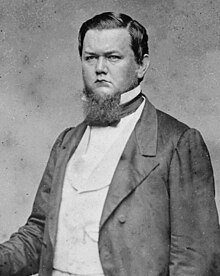Henry Burnett | |
|---|---|
 | |
| Confederate States Senator from Kentucky | |
| In office February 18, 1862 – May 10, 1865 | |
| Preceded by | Constituency established |
| Succeeded by | Constituency abolished |
| Member of the U.S. House of Representatives from Kentucky's 1st district | |
| In office March 4, 1855 – December 3, 1861 | |
| Preceded by | Linn Boyd |
| Succeeded by | Samuel Casey |
| Personal details | |
| Born | October 25, 1825 Essex County, Virginia, U.S. |
| Died | October 1, 1866 (aged 40) Hopkinsville, Kentucky, U.S. |
| Political party | Democratic |
| Signature | |
| Military service | |
| Allegiance | Confederate States |
| Branch/service | Confederate States Army |
| Years of service | 1861–1862 |
| Rank | Colonel |
| Unit | 8th Kentucky Infantry |
| Battles/wars | American Civil War |
Henry Cornelius Burnett (October 25, 1825 – October 1, 1866) was an American politician who served as a Confederate States senator from Kentucky from 1862 to 1865. From 1855 to 1861, Burnett served four terms in the United States House of Representatives. A lawyer by profession, Burnett had held only one public office—circuit court clerk—before being elected to Congress. He represented Kentucky's 1st congressional district immediately prior to the Civil War. This district contained the entire Jackson Purchase region of the state, which was more sympathetic to the Confederate cause than any other area of Kentucky. Burnett promised the voters of his district that he would have President Abraham Lincoln arraigned for treason. Unionist newspaper editor George D. Prentice described Burnett as "a big, burly, loud-mouthed fellow who is forever raising points of order and objections, to embarrass the Republicans in the House".[1]
Besides championing the secession in Congress, Burnett also worked within Kentucky to bolster the state's support of the Confederacy. He presided over a sovereignty convention in Russellville in 1861 that formed a Confederate government for the state. The delegates to this convention chose Burnett to travel to Richmond, Virginia to secure Kentucky's admission to the Confederacy. Burnett also raised a Confederate regiment at Hopkinsville, Kentucky, and briefly served in the Confederate States Army. Camp Burnett, a Confederate recruiting post two miles west of Clinton in Hickman County, Kentucky, was named after him.[2]
Burnett's actions were deemed treasonable by his colleagues in Congress, and he was expelled from the House in 1861. He is one of only six members of the House of Representatives ever to be expelled.[3] Following his expulsion, Burnett served in the Provisional Confederate Congress and the First and Second Confederate Senates. He was indicted for treason after the war, but never tried. He returned to the practice of law, and died of cholera in 1866 at the age of 40.